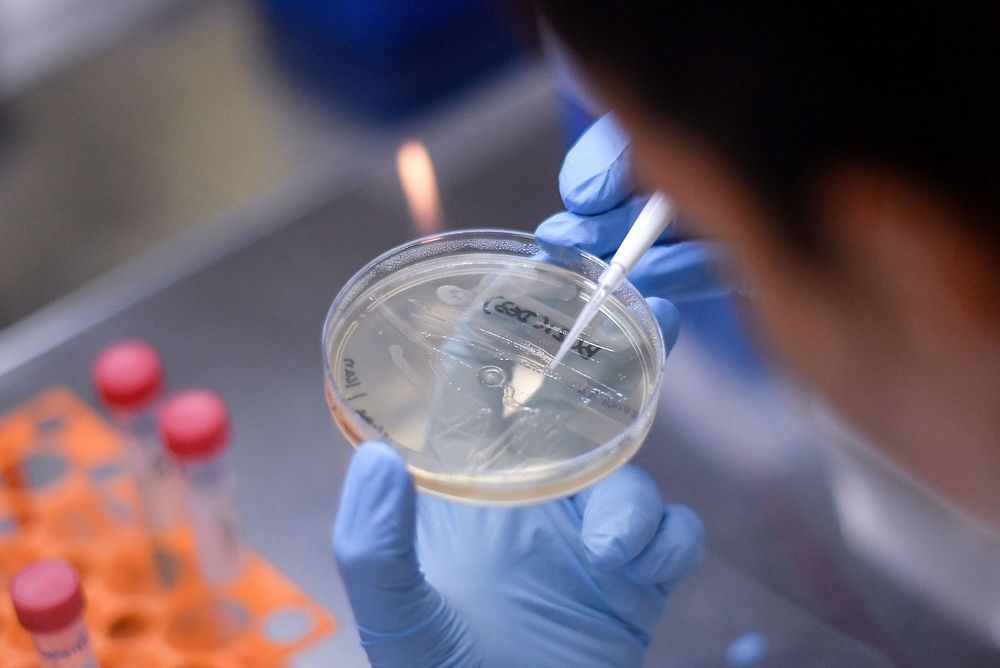Apr 16, 2020
Coronavirus Picks on Some Cells More Than Others
Posted by Omuterema Akhahenda in category: biotech/medical
The virus may infect bronchial transient secretory cells more because of high levels of ACE2 and TMPRSS2.
The virus may infect bronchial transient secretory cells more because of high levels of ACE2 and TMPRSS2.
Test Coronavirus in minutes:
The ongoing outbreak of the novel coronavirus disease (COVID-19) has spread globally and poses a threat to public health in more than 200 countries. Reliable laboratory diagnosis of the disease has been one of the foremost priorities for promoting public health interventions. The routinely used reverse transcription polymerase chain reaction (RT-PCR) is currently the reference method for COVID-19 diagnosis. However, it also reported a number of false-positive or –negative cases, especially in the early stages of the novel virus outbreak. In this work, a dual-functional plasmonic biosensor combining the plasmonic photothermal (PPT) effect and localized surface plasmon resonance (LSPR) sensing transduction provides an alternative and promising solution for the clinical COVID-19 diagnosis. The two-dimensional gold nanoislands (AuNIs) functionalized with complementary DNA receptors can perform a sensitive detection of the selected sequences from severe acute respiratory syndrome coronavirus 2 (SARS-CoV-2) through nucleic acid hybridization. For better sensing performance, the thermoplasmonic heat is generated on the same AuNIs chip when illuminated at their plasmonic resonance frequency. The localized PPT heat is capable to elevate the in situ hybridization temperature and facilitate the accurate discrimination of two similar gene sequences. Our dual-functional LSPR biosensor exhibits a high sensitivity toward the selected SARS-CoV-2 sequences with a lower detection limit down to the concentration of 0.22 pM and allows precise detection of the specific target in a multigene mixture. This study gains insight into the thermoplasmonic enhancement and its applicability in the nucleic acid tests and viral disease diagnosis.
Article Views are the COUNTER-compliant sum of full text article downloads since November 2008 (both PDF and HTML) across all institutions and individuals. These metrics are regularly updated to reflect usage leading up to the last few days.
When researchers reported last month that the novel coronavirus causing the COVID-19 pandemic survives for days on glass and stainless steel but dies within hours after landing on copper, the only thing that surprised Bill Keevil was that the pathogen lasted so long on copper.
Global stocks have lost at least $6 trillion in market value since Jan. 20 when the coronavirus outbreak first started becoming a concern for investors. The decline accelerated this week as the spread of cases outside of China picked up pace, sparking a worldwide sell-off that led to six straight sessions of losses for stocks through Thursday. Infections in South Korea have skyrocketed to more than 2,000 from less than 100 a week ago, while new cases in Italy and Iran have also seen a sharp up-t.
It is urgent to understand the future of severe acute respiratory syndrome–coronavirus 2 (SARS-CoV-2) transmission. We used estimates of seasonality, immunity, and cross-immunity for betacoronaviruses OC43 and HKU1 from time series data from the USA to inform a model of SARS-CoV-2 transmission. We projected that recurrent wintertime outbreaks of SARS-CoV-2 will probably occur after the initial, most severe pandemic wave. Absent other interventions, a key metric for the success of social distancing is whether critical care capacities are exceeded. To avoid this, prolonged or intermittent social distancing may be necessary into 2022. Additional interventions, including expanded critical care capacity and an effective therapeutic, would improve the success of intermittent distancing and hasten the acquisition of herd immunity. Longitudinal serological studies are urgently needed to determine the extent and duration of immunity to SARS-CoV-2. Even in the event of apparent elimination, SARS-CoV-2 surveillance should be maintained since a resurgence in contagion could be possible as late as 2024.
The ongoing severe acute respiratory syndrome–coronavirus 2 (SARS-CoV-2) pandemic has caused nearly 500,000 detected cases of coronavirus disease 2019 (COVID-19) illness and claimed over 20,000 lives worldwide as of 26 Mar 2020. Experience from China, Italy, and the United States demonstrates that COVID-19 can overwhelm even the healthcare capacities of well-resourced nations (2–4). With no pharmaceutical treatments available, interventions have focused on contact tracing, quarantine, and social distancing. The required intensity, duration, and urgency of these responses will depend both on how the initial pandemic wave unfolds and on the subsequent transmission dynamics of SARS-CoV-2. During the initial pandemic wave, many countries have adopted social distancing measures, and some, like China, are gradually lifting them after achieving adequate control of transmission.
The widespread perception that it was once official British policy to let the novel coronavirus spread until the population reached herd immunity is false; the government was just overly optimistic about how easy flattening the curve would be. But the idea has gained so much traction in some circles, fueled by speculation that we might already be much closer to it than we think, that it’s worth understanding why it’s not a viable policy according to the evidence to date.

As the world fights against the COVID-19 pandemic, nuclear weapons have taken a backseat in most people’s minds. But for Global Strike Command (AFGSC)—the Air Force unit in control of two of the three legs of America’s nuclear triad—their mission remains top priority.
And it’s an unforgiving business. Nuclear deterrence requires extreme levels of readiness among pilots, maintenance crews, and security teams. Adversaries that don’t think the U.S. can respond with conventional bombing strikes or nukes could be emboldened to act aggressively.
Continue reading “The Coronavirus Can’t Stop America’s Nukes” »

Experts explained to Newsweek why this doesn’t jeopardize efforts to create a vaccine to prevent COVID-19.
The mining industry is focused on continuing production through the COVID-19 pandemic, writes Margaret Gleeson, despite workers’ and local communities’ concerns.